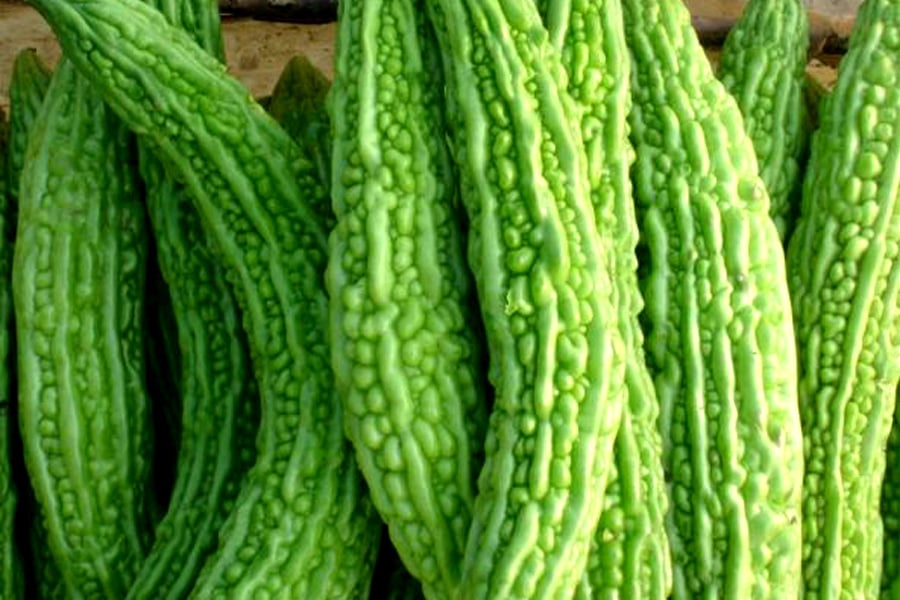ADVERTISEMENT
Selon le Dr Frank Shallenberger, lorsqu’il s’agit de la lutte contre le cancer, il est toujours à la recherche de substances naturelles qui interrompent le métabolisme des cellules cancéreuses. Certaines de ses découvertes incluent le resvératrol, le thé vert, le seanol, et d’autres plantes et phytonutriments. Plus récemment, il a trouvé un fruit qui a été efficace pour tuer les cellules cancéreuses pancréatiques. Le fruit est appelé « melon amer » et il est populaire à Okinawa, au Japon.
Quand le jus de melon amer est dilué à 5% dans l’eau, il s’est avéré être très dommageable pour les lignées cellulaires du cancer du pancréas. Selon les chercheurs, le jus de melon amer réduit la viabilité de deux lignées cellulaires du cancer de 90% et a tué les deux lignées restantes à un taux de 98%.
Donc, très bien, ces études montrent que le melon amer fonctionne in vitro. Mais fonctionne-il chez les animaux? Va-t-il fonctionner chez les gens? Apparemment oui. Les chercheurs de l’université du Colorado ont administré des doses de melon amer à des souris et ont constaté une réduction de 64% de la taille de la tumeur pancréatique sans aucune sorte d’effet secondaire.
La posologie correspondait à six grammes de poudre pour la taille humaine moyenne. Le melon amer peut également aider les diabétiques. Les chercheurs ont constaté que le melon amer aide à améliorer les problèmes métaboliques de par ses effets sur le métabolisme du glucose.
Lire aussi:
- Etudes: l’effet du melon amer sur les cellules cancéreuses
- Plus de 70 plantes médicinales qui luttent contre le cancer
Sources:
Grover JK, Yadav S, Vats V. Medicinal plants of India with anti-diabetic potential. J Ethnopharmacol 2002;81:81–100. https://www.sciencedirect.com/science/article/pii/S0378874102000594
Jayasooriya AP, Sakono M, Yukizaki C, Kawano M, Yamamoto K, Fukuda N. Effects of Momordica charantia powder on serum glucose levels and various lipid parameters in rats fed with cholesterol-free and cholesterol-enriched diets. J Ethnopharmacol 2002;72:331–6. https://www.ncbi.nlm.nih.gov/pubmed/10967491
Chao CY, Huang CJ. Bitter gourd (Momordica charantia) extract activates peroxisome proliferator-activated receptors and upregulates the expression of the acyl CoA oxidase gene in H4IIEC3 hepatoma cells. J Biomed Sci 2003;10:782–91. https://www.ncbi.nlm.nih.gov/pmc/articles/PMC3311063/
Chen Q, Chan LL, Li ET. Bitter melon (Momordica charantia) reduces adiposity, lowers serum insulin and normalizes glucose tolerance in rats fed a high fat diet. J Nutr 2003;133:1088–93.https://academic.oup.com/jn/article/133/4/1088/4688141 (Free full text)
Nerurkar PV, Lee YK, Motosue M, Adeli K, Nerurkar VR. Momordica charantia (bitter melon) reduces plasma apolipoprotein B-100 and increases hepatic insulin receptor substrate and phosphoinositide-3 kinase interactions.British Journal of Nutrition 2008;100:751–9. https://www.cambridge.org/core/journals/british-journal-of-nutrition/article/momordica-charantia-bitter-melon-reduces-plasma-apolipoprotein-b100-and-increases-hepatic-insulin-receptor-substrate-and-phosphoinositide3-kinase-interactions/F1D72A503E1EF799A0A108F630FAD062
https://www.naturalnews.com/039583_bitter_melon_pancreatic_cancer_cytotoxicity.html
Manjinder Kaur, Gagan Deep, Anil K. Jain, Komal Raina, Chapla Agarwal, Michael F. Wempe and Rajesh Agarwal. Bitter melon juice activates cellular energy sensor AMP-activated protein kinase causing apoptotic death of human pancreatic carcinoma cells University of Colorado, 2013.https://academic.oup.com/carcin/article/34/7/1585/2463166 (free full text)
Ray R.B., Raychoudhuri A., Steele R., & Nerurkar P. (2010). Bitter melon (Momordica charantia) extract inhibits breast cancer cell proliferation by modulating cell cycle regulatory genes and promotes apoptosis. Cancer Research, 70(5): 1925-1931. doi: 10.1158/0008-5472.CAN-09-3438. Full text:http://cancerres.aacrjournals.org/content/70/5/1925.long
Pongnikorn S., Fongmoon D., Kasinrerk W., & Limtrakul P. N. (2003). Effect of bitter melon (Momordica charantia Linn) on level and function of natural killer cells in cervical cancer patients with radiotherapy. Journal of the Medical Association of Thailand, 86(1): 61-68. https://www.ncbi.nlm.nih.gov/pubmed/12678140
Ru P., Steele R., Nerurkar P. V., Phillips N., & Ray R. B. (2011). Bitter melon extract impairs prostate cancer cell-cycle progression and delays prostatic intraepithelial neoplasia in TRAMP model. Cancer Prevention Research (Phila), 4(12): 2122-2130. doi: 10.1158/1940-6207. https://www.ncbi.nlm.nih.gov/pubmed/21911444
ADVERTISEMENT
